Context:
∙ A ‘Vulture Restaurant’ has been established in Koderma of Jharkhand to conserve the declining vulture population.
About the Vulture Restaurant
∙ It is an undisturbed area where non-toxic, poison-free meat and carcasses are provided for vultures and other scavengers.
∙ The initiative aims to address the adverse impact of livestock drugs, particularly diclofenac, on vultures.
∙ The first ‘vulture restaurant’ came up in 2015 at Phansad Wildlife Sanctuary in Raigad, Maharashtra.
ο There are four other such restaurants, all in the same state.
Types of Vultures
∙ Vultures are one of the 22 species of large carrion-eating birds that live mostly in the tropics and subtropics.
∙ They act as nature’s garbage collectors
∙ Vultures play a valuable role in keeping wildlife diseases in check.
∙ India is home to nine species of Vulture namely the Oriental white-backed, Long-billed,
∙ Slender-billed, Himalayan, Red-headed, Egyptian, Bearded, Cinereous and the Eurasian Griffon.
Conservation Status
∙ Schedule-1 of the Wildlife Protection Act 1972: Bearded, Long-billed, Slender-billed,Oriental white-backed.
∙ Rest are protected under ‘Schedule IV’.
∙ IUCN Red List:
∙ Critically Endangered:
∙ Oriental White-backed Vulture, Long-billed Vulture, Slender-billed Vulture and Red-headed Vulture.
∙ Endangered: Egyptian Vulture
∙ Least Concerned: Eurasian Griffon
Threats
∙ Use of Diclofenac: A veterinary nonsteroidal anti-inflammatory drug (NSAID) found in the carcass of cattle the vultures feed on. The veterinary use of diclofenac was banned in 2008.
∙ Pesticides: The presence of organochlorine pesticide, polychlorinated biphenyls, polycyclic aromatic hydrocarbons and heavy metals were also the major cause of mortality.
∙ Other threats include lack of nesting trees, electrocution by power lines, and food dearth and contaminated food.
Conservation Efforts
∙ The National Board for Wildlife (NBWL) has approved an Action Plan for Vulture Conservation 2020-2025. It includes:
∙ Vulture Conservation Centre: Uttar Pradesh, Tripura, Maharashtra, Karnataka and Tamil Nadu will get a vulture conservation and breeding centre.
∙ Vulture Safe Zone: Establishment of at least one vulture-safe zone in each state for the conservation of the remnant populations in that state.
∙ Rescue Centres: Establishment of four rescue centres, in Pinjore (Haryana), Bhopal (Madhya Pradesh), Guwahati (Assam) and Hyderabad (Telangana). There are currently no dedicated rescue centres for treating vultures.
∙ Establishment of Vulture Conservation and Breeding Centres: there are nine VCB Centres in India, of which three are directly administered by the Bombay Natural History Society (BNHS).
∙ Involvement of local villagers as ‘gidhaad mitra’ for rejuvenation and conservation efforts.


